Overview
To develop an entrepreneurial mindset, individuals should focus on embracing innovation, adaptability, and proactive problem-solving, which are critical traits for success in today’s dynamic work environment. The article outlines practical steps such as setting clear goals, committing to continuous learning, and practicing resilience, demonstrating that cultivating these characteristics can empower individuals to navigate challenges and thrive in their careers.
Introduction
In a world where the traditional career path is constantly evolving, the entrepreneurial mindset has emerged as a crucial asset for professionals across all fields. This approach emphasizes innovation, adaptability, and a proactive stance toward challenges—qualities that are increasingly essential in today’s dynamic work environment.
With millions of individuals embracing self-employment and the entrepreneurial spirit, understanding how to cultivate these traits can empower professionals to navigate career transitions effectively. By integrating an entrepreneurial mindset into their daily practices, individuals can unlock new opportunities, foster personal growth, and enhance their overall career satisfaction.
This article delves into the core components of the entrepreneurial mindset, practical steps for development, key characteristics of successful entrepreneurs, and strategies for fostering an entrepreneurial culture within organizations, all aimed at equipping readers with the tools they need to thrive in an ever-changing economic landscape.
Understanding the Entrepreneurial Mindset
Understanding how to developing an entrepreneurial mindset involves embracing a distinctive way of thinking that prioritizes innovation, adaptability, and a proactive approach to challenges—key traits for navigating today’s dynamic work environment. With approximately 15 million entrepreneurs currently in the U.S., this mindset is increasingly relevant across various professional contexts, not just for those launching new ventures. Key components include:
- A willingness to take calculated risks
- The resilience to learn from failures
- A dedicated focus on problem-solving
As noted by Aulet, ‘We have to have large organizations that have infrastructure, balance sheets, other assets, and global presence to be able to address these major challenges.’ This insight highlights the significance of both business and organizational thinking in navigating today’s complex landscape. The trend towards self-employment is significant, with projections indicating that by the end of 2020, 27 million Americans would transition to full-time self-employment.
This change demonstrates a rising spirit of innovation, especially as small enterprises, which represent 99.9% of all firms, generated 10.5 million net new positions from 2000-2019. By embracing these elements, individuals can effectively shift their perspectives, especially in learning how to developing an entrepreneurial mindset and integrating a business-oriented approach into their careers. Such a mindset is crucial for how to Developing an entrepreneurial mindset, as it not only enhances personal development but is also vital for thriving in today’s economy, empowering clients towards financial freedom and career fulfillment through unique franchise and business consulting.
If you’re encountering challenges such as aging out of your role or looking for an exit strategy, think about how embracing a business-oriented mindset can assist you in managing these transitions. Explore your options for career ownership and seek coaching to clarify your goals and overcome obstacles.
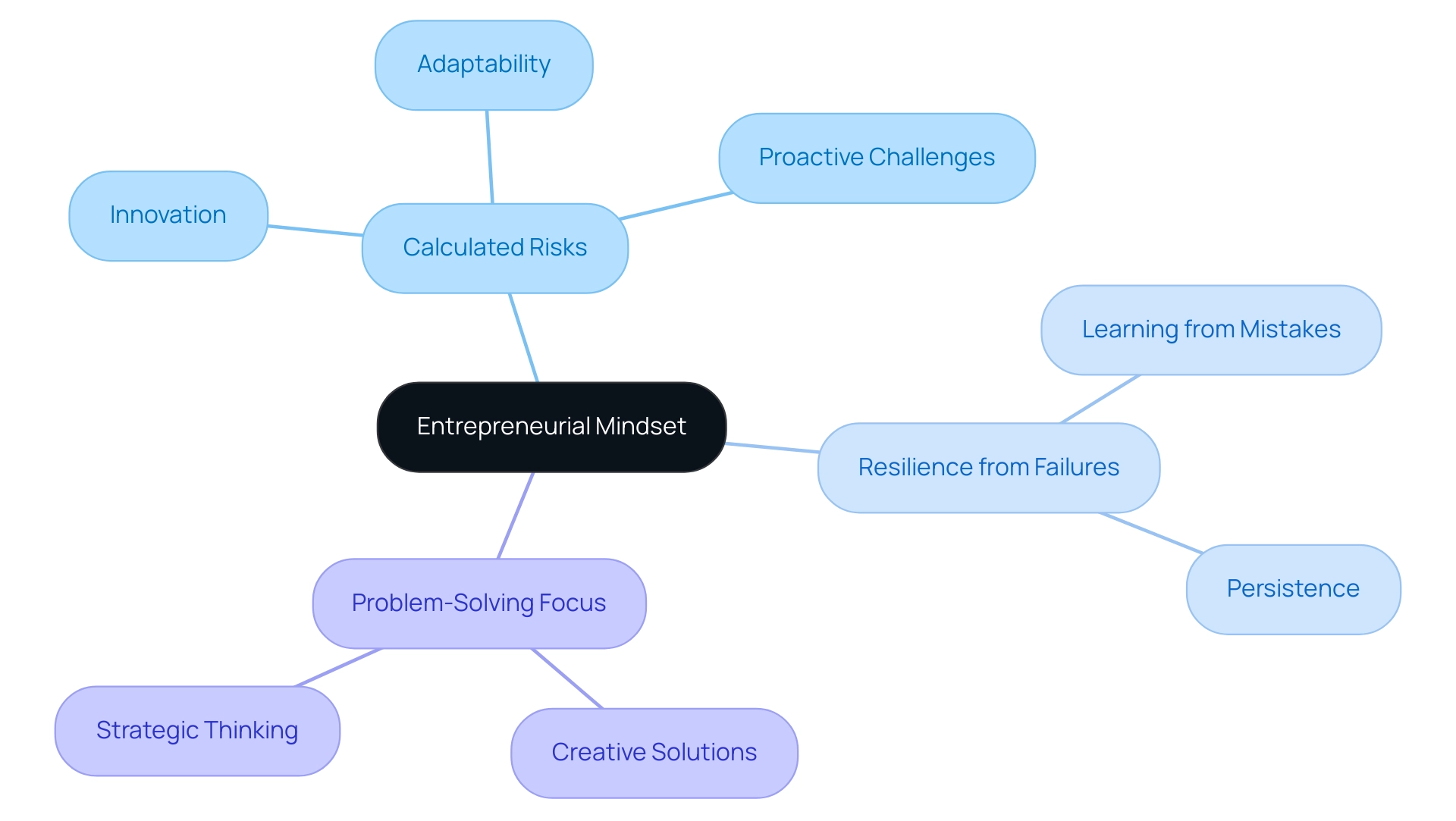
Practical Steps to Cultivate an Entrepreneurial Mindset
- Set Clear Goals: Defining what success means to you is critical. Start by breaking down your overarching goals into smaller, actionable steps with specific timelines. Research shows that 83% of companies support the OKR (Objectives and Key Results) framework to align corporate goals effectively, highlighting the significance of goal-setting in business success. As noted by Haufe Talent, this framework can significantly enhance outcomes for businesses.
- Embrace Learning: A commitment to continuous education is essential. Whether through formal courses, workshops, or self-directed study, expanding your knowledge base can significantly enhance your business journey. The most successful entrepreneurs often attribute their achievements to their dedication to lifelong learning, illustrating its pivotal role. Continuous learning not only fosters skill development but also contributes to the increased happiness and confidence reported by many successful entrepreneurs.
- Network with Entrepreneurs: Surrounding yourself with like-minded individuals can provide inspiration and motivation. Attend networking events or join entrepreneurial groups to build connections that may facilitate collaboration and support. The significance of small businesses is highlighted by the fact that they account for 99.9% of all businesses in the U.S., making these networks particularly valuable.
- Practice Resilience: Setbacks are a natural part of entrepreneurship. Instead of viewing failure as a dead end, analyze what went wrong and adapt your approach. Remember, resilience is about learning and growing from these experiences, which ultimately leads to greater confidence and success.
- Innovate: Challenge yourself to think outside the box regularly. Dedicate time to brainstorming new ideas or alternative solutions to existing challenges. Innovation drives entrepreneurship, and the ability to pivot creatively can set you apart in a competitive landscape. These practical steps, when combined with how to develop an entrepreneurial mindset focused on continuous improvement, can significantly increase your chances of success in the entrepreneurial realm.
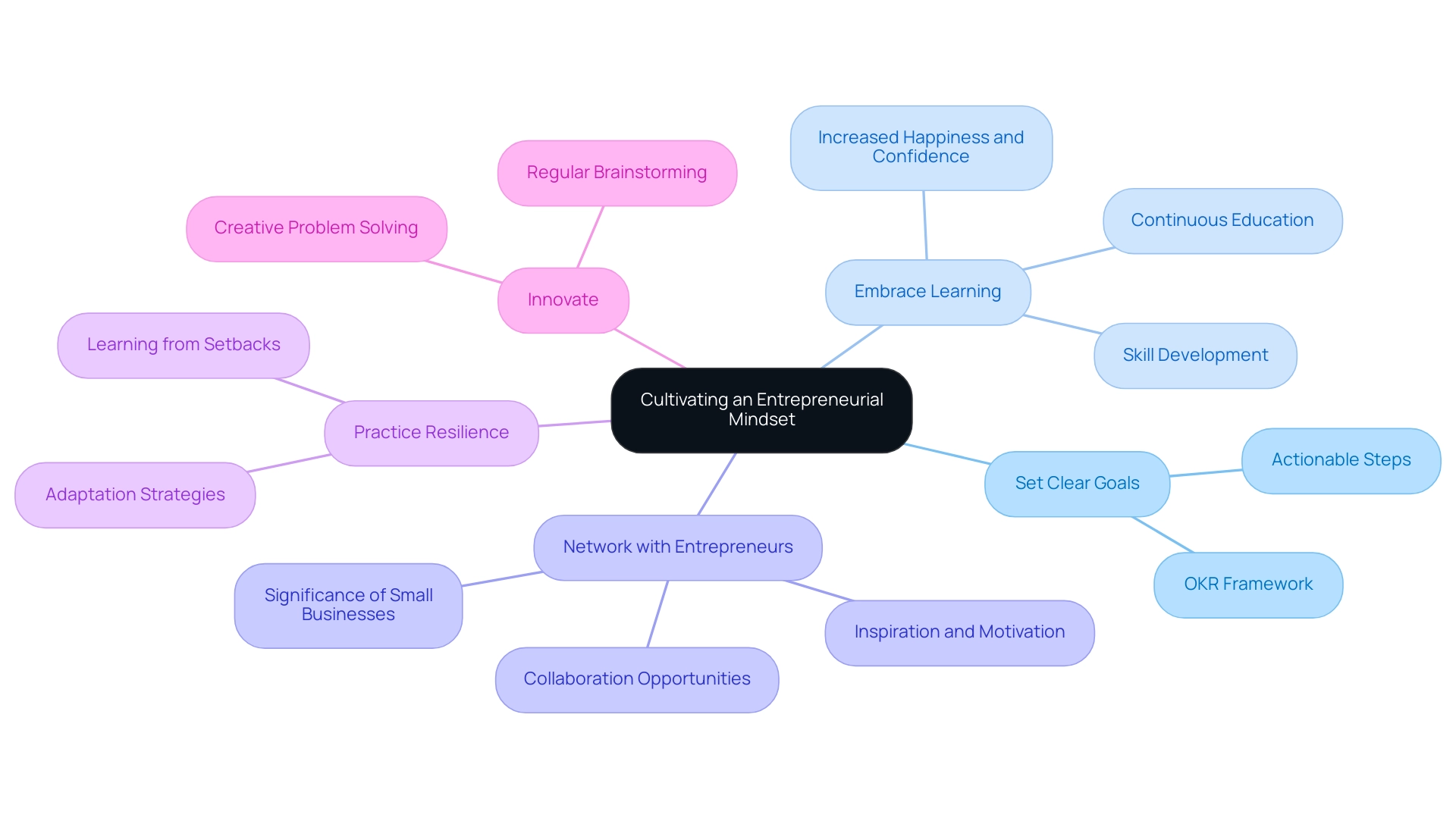
Key Characteristics of Successful Entrepreneurs
Successful business owners often embody a set of key characteristics that contribute to their achievements:
-
Creativity: The ability to generate innovative ideas and solutions is fundamental in business. A significant number of innovators leverage their creativity to differentiate their offerings in a competitive market.
-
Flexibility: In an ever-evolving commercial landscape, adaptability is crucial. Successful business leaders demonstrate a willingness to pivot their strategies in response to emerging trends or unexpected challenges, thereby capitalizing on new opportunities.
-
Risk-Taking: Embracing calculated risks is vital for growth. Entrepreneurs must step outside their comfort zones, as evidenced by recent interviews with successful business leaders who emphasize that strategic risk-taking often leads to substantial rewards. As Indra Nooyi, former CEO of PepsiCo, stated,
Just because you are CEO, don’t think you have landed. You must continually increase your learning…
This mindset is applicable across all levels of business ownership.
-
Vision: Having a clear and compelling vision helps individuals remain focused on their goals. This visionary approach not only guides their decision-making but also inspires their teams and stakeholders to work toward a common objective.
-
Persistence: Perhaps one of the most critical traits, persistence enables individuals to overcome obstacles and challenges. Numerous accomplished businesspeople have recounted tales of early setbacks that acted as educational moments, strengthening the notion that resilience is crucial in the path of business ventures.
By acknowledging and nurturing these characteristics, individuals can greatly improve their business skills and learn how to develop an entrepreneurial mindset. The landscape of entrepreneurship continues to evolve, and as shown in a recent analysis, understanding how to develop an entrepreneurial mindset is crucial, as education levels among entrepreneurs vary widely, with 31% holding an associate degree and 30% having only a high school diploma. This suggests that educational attainment is not a barrier to success; rather, the key characteristics of creativity, flexibility, risk-taking, vision, and persistence are what truly drive entrepreneurial success.
Additionally, it is noteworthy that in 2019, female-owned businesses earned an average of $142,900 compared to $474,900 for all privately held businesses, highlighting the financial rewards that successful entrepreneurship can yield. Furthermore, successful entrepreneurs often experience financial, professional, and personal rewards, necessitating strong leadership, management skills, and problem-solving abilities.
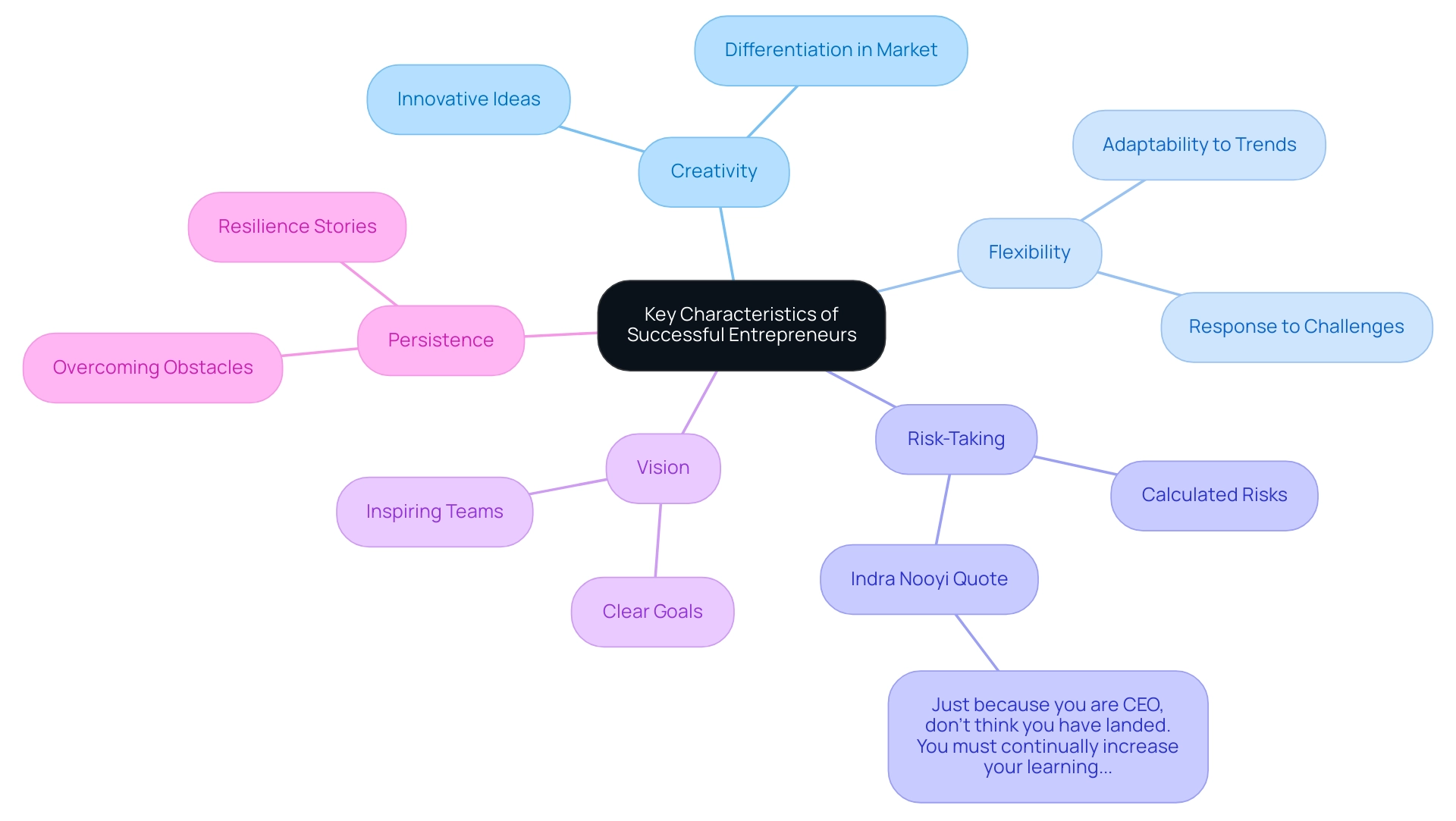
Fostering an Entrepreneurial Culture in Organizations
To foster a business-oriented culture within an organization and support career transitioners, several key strategies can be implemented:
- Encourage Innovation: Establish an environment that empowers employees to share their ideas and take calculated risks without fear of failure. When individuals feel secure in their ability to innovate, creativity flourishes, leading to groundbreaking solutions that can also serve as a foundation for personal agency and financial independence, especially crucial in a declining job market where conventional career options are limited.
- Provide Resources: Equip your teams with the necessary tools and resources to explore innovative projects. This includes access to technology, training programs, and time dedicated to brainstorming new ideas. The appropriate support not only fosters creativity but also promotes the growth of transferable skills vital for navigating career obstacles and building wealth and equity in an uncertain economic landscape.
- Recognize Efforts: Highlight and celebrate both successes and learning opportunities from failures. Acknowledging the efforts of individuals reinforces a culture of experimentation, where employees are motivated to push boundaries, explore new avenues, and engage with their community, further enhancing their employability in a rapidly changing economy.
- Promote Collaboration: Foster cross-functional teamwork that leverages diverse perspectives and skills. Strong leadership plays a crucial role in promoting collaboration among teams, ensuring that all voices are heard and valued. Collaboration not only enhances creativity but also drives innovation by combining different ideas and approaches, creating a supportive network for those navigating career transitions, particularly important as job longevity decreases.
Implementing these strategies can significantly enhance an organization’s spirit of innovation, ultimately driving growth and advancement. This approach is vital, particularly noting that employees experiencing mental health issues are four times more likely to consider leaving their positions. By nurturing an environment where innovation and collaboration thrive, companies can significantly boost employee engagement and satisfaction.
Evidence shows that organizations with thriving cultures report 102% higher employee satisfaction, as highlighted in the case study titled ‘Impact of Thriving Cultures on Employee Satisfaction.’ As Candice Matthews Brackeen insightfully states,
The pie will ultimately run out, but the garden lends itself to growing through seeds planted for others.
This highlights the importance of fostering a culture that not only drives immediate results but also plants the seeds for future success and financial freedom.
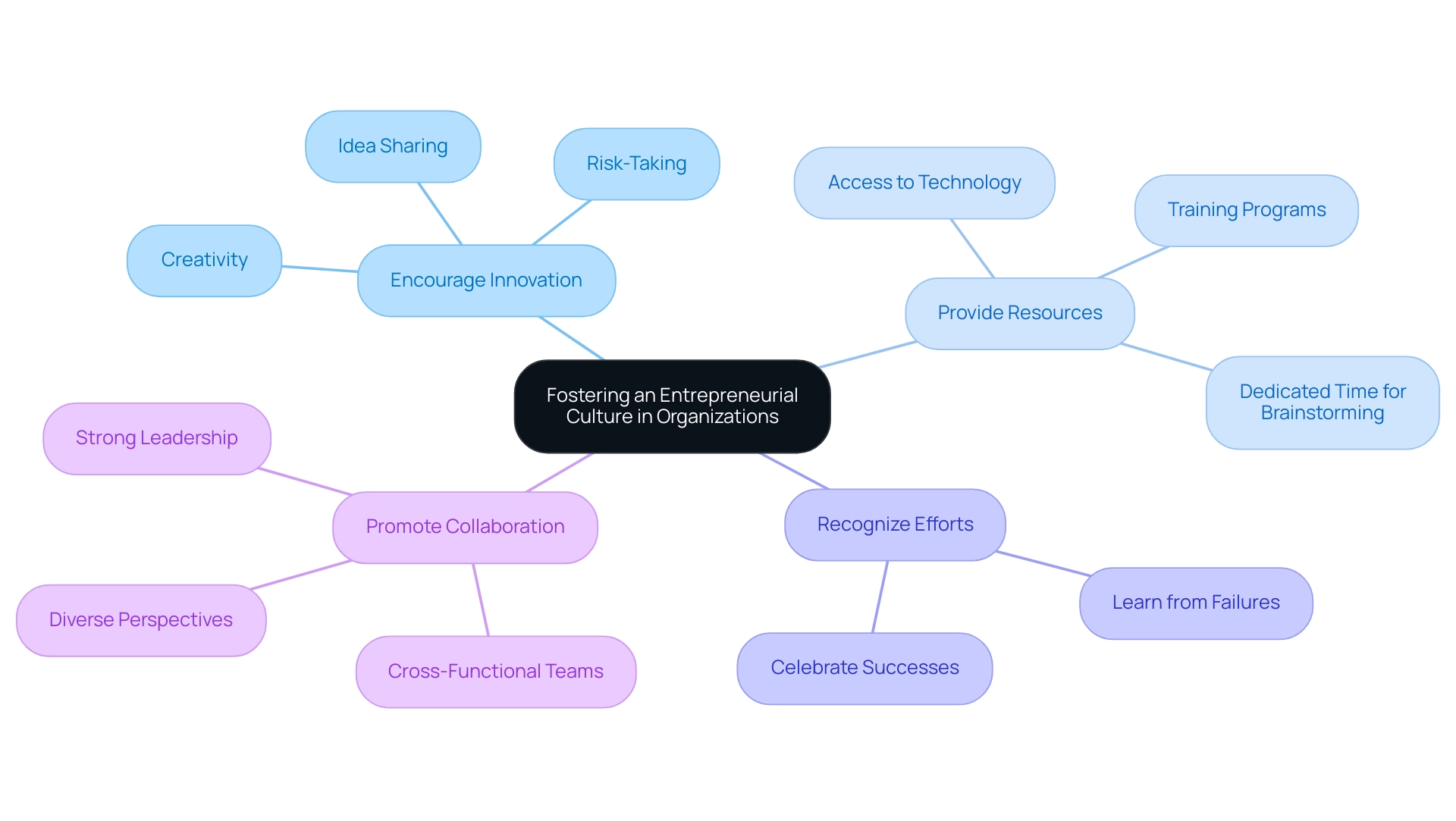
Overcoming Challenges in Developing an Entrepreneurial Mindset
Cultivating a business-oriented mindset involves its set of obstacles, and it is essential to recognize and tackle these difficulties to promote resilience. One prominent challenge is self-doubt. It’s important to understand that self-doubt is a natural aspect of the entrepreneurial journey, yet it can be transformed through empowerment and supportive coaching.
Nearly 54.5% of business owners aged 35 and over report struggling with anxiety, illustrating the prevalence of this issue. Additionally, 24% of business owners are experiencing burnout due to factors beyond their control, such as inflation, which can exacerbate feelings of self-doubt. To combat self-doubt, practice positive affirmations, engage in introspection, and seek the company of supportive individuals who uplift and inspire you.
Consider exploring workshops or resources that focus on career ownership possibilities to further empower yourself.
Another significant concern is fear of failure. Shifting your perspective on failure can transform it from a setback into a valuable learning opportunity. Reflecting on past failures can help you extract essential lessons that inform your future decisions.
Embracing this mindset not only alleviates fear but also enhances your capacity for growth, especially when guided by a coach who can help clarify your business goals. Moreover, many individuals in business face resistance to change. Embracing change is key to personal and professional development.
Start by gradually stepping out of your comfort zone; undertake small experiments that can build your confidence over time. Dr. Anne Welsh, a clinical psychologist and executive coach, emphasizes,
Entrepreneurship is a marathon, not a sprint. So rest is actually incredibly important.
This emphasizes that rest and various activities can refresh your spirit, enabling you to confront difficulties with renewed vigor. Furthermore, a healthy amount of doubt can lead to better decision-making and encourage multiple experiments, framing self-doubt as a potentially beneficial aspect of the business mindset.
The financial concerns faced by many entrepreneurs, particularly female entrepreneurs—44.1% of whom worry about finances—also contribute to self-doubt. By acknowledging these challenges and implementing strategies, including coaching and educational resources, to navigate them, you can cultivate a more resilient approach to developing an entrepreneurial mindset, essential for long-term success. Remember, embracing your career ownership possibilities is a vital step toward achieving your goals.
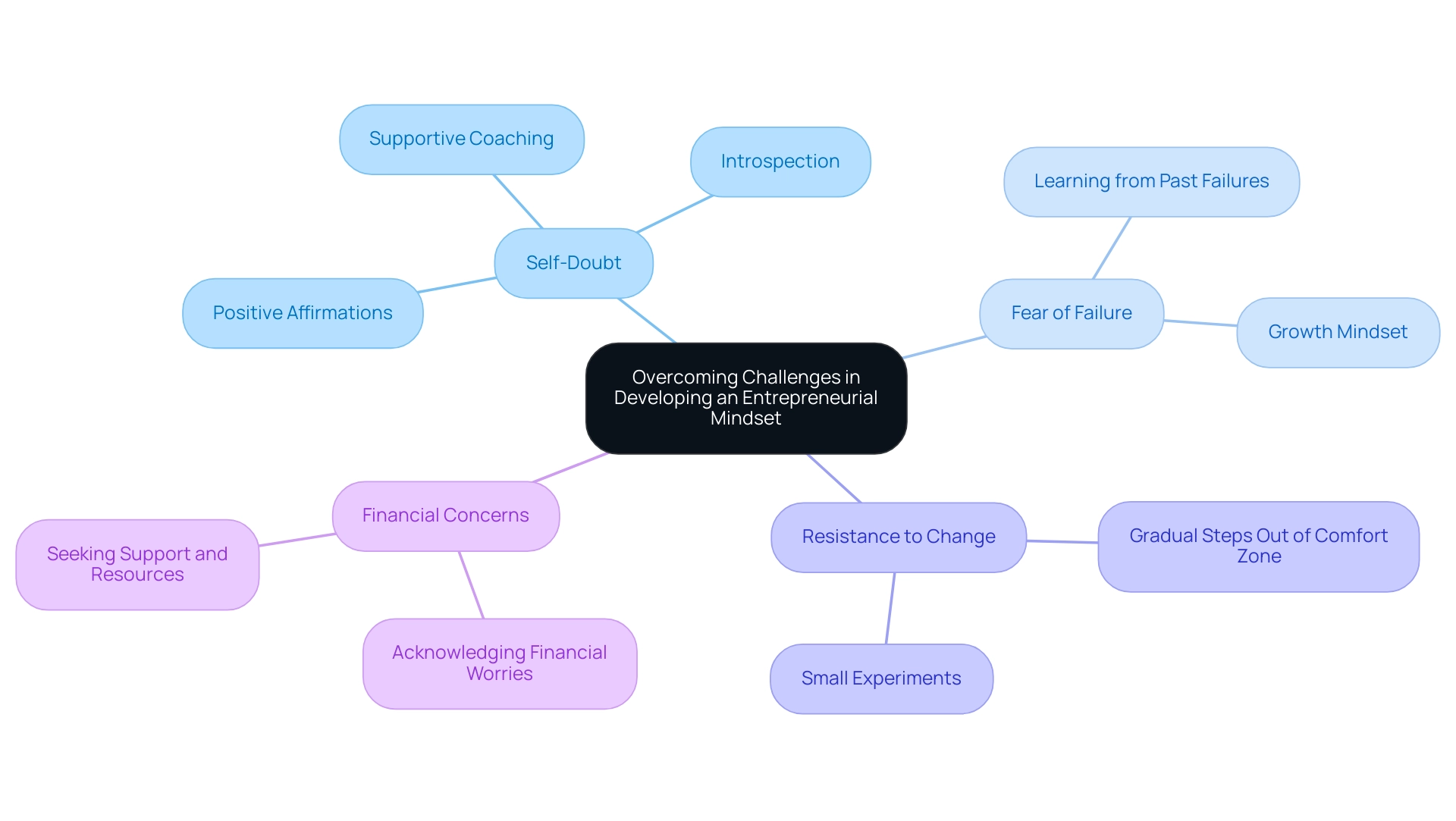
Conclusion
Embracing an entrepreneurial mindset is essential for professionals navigating the complexities of today’s work environment. By understanding the core components of this mindset—innovation, adaptability, and proactive problem-solving—individuals can position themselves to seize new opportunities and foster personal growth. The rise in self-employment and the significant role of small businesses in job creation underscore the importance of cultivating these traits, allowing professionals to thrive amidst change.
Practical steps such as:
- Setting clear goals
- Committing to lifelong learning
- Building a supportive network
are vital in developing an entrepreneurial approach. Successful entrepreneurs share key characteristics, including:
- Creativity
- Flexibility
- Persistence
which can be nurtured regardless of educational background. These qualities not only enhance individual capabilities but also contribute to broader organizational success, fostering a culture where innovation and collaboration flourish.
Addressing the challenges of developing an entrepreneurial mindset—such as self-doubt and fear of failure—is crucial for long-term success. By reframing setbacks as learning opportunities and embracing change, individuals can build resilience and confidence in their abilities. Organizations that encourage this mindset through supportive environments and recognition of efforts can significantly boost employee satisfaction and engagement.
In conclusion, cultivating an entrepreneurial mindset is not merely beneficial; it is imperative for those seeking fulfillment and success in their careers. By integrating these practices into daily life, individuals can navigate transitions effectively, unlocking a path toward financial independence and career satisfaction in an ever-evolving economic landscape.


